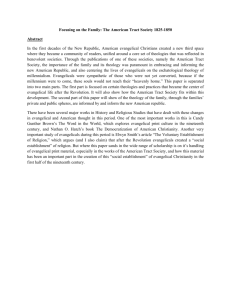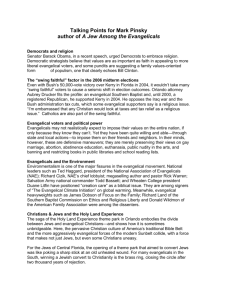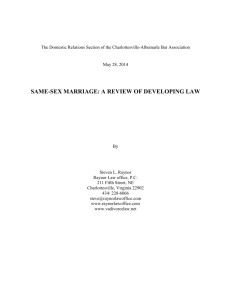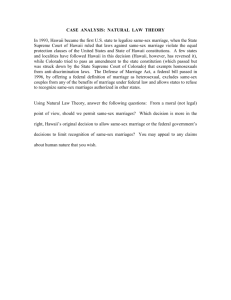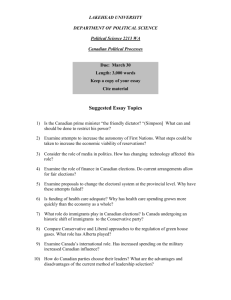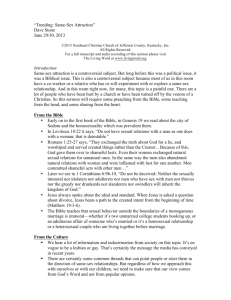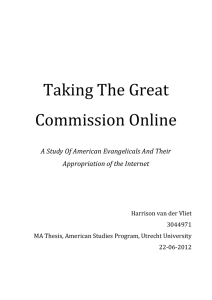Jesusland North? The Christian Right in Canadian Politics
advertisement
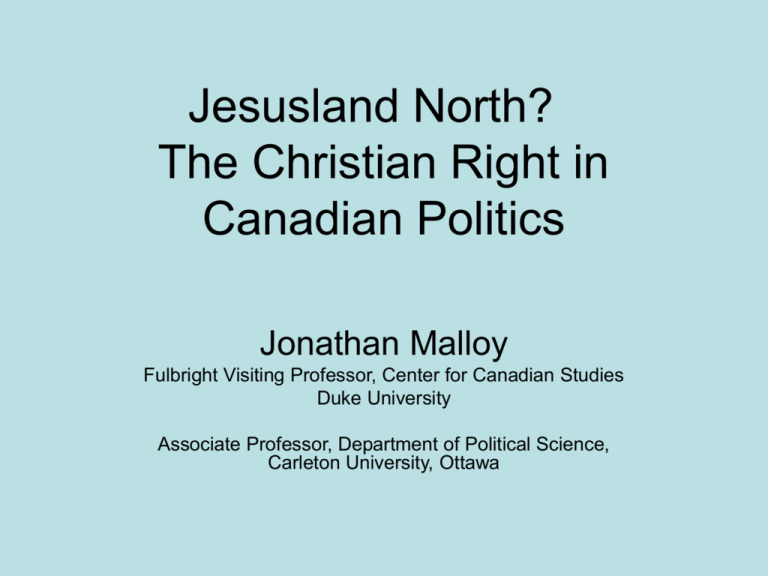
Jesusland North? The Christian Right in Canadian Politics Jonathan Malloy Fulbright Visiting Professor, Center for Canadian Studies Duke University Associate Professor, Department of Political Science, Carleton University, Ottawa Jesusland: Where does Canada Fit? Canada: Jesusland North? 2006 election of evangelically-influenced Conservative government Attempts to reverse legalization of same-sex marriage Increased mobilization and activity by Christian Right Religion in Canada: Traditional • Prior to 1960s, similar or higher levels of religiosity in Canada compared to U.S. – Higher church attendance – Political and social rhetoric rooted in Christianity – Multiple church-state connections • “More observant…and more orthodox” (Mark Noll) • Particularly strong Catholic presence in French-speaking Quebec Religion in Canada: Since 1960s • Dramatic decrease in religiosity in Canada – Church attendance now well below U.S. – Absence of religious rhetoric and behavior in Canadian public life • Most dramatic changes in Quebec • Strong secularization trend across Canada Evangelicals Growing evangelical population in Canada since 1970s, as in USA Approximately half the proportion found in the USA (1015% vs. 20-30% of population) – about 3-5 million people Strong cross-border subculture and connections Christian Right • Unlike the USA, no major Christian Right emerged in Canada in the 1980s and 1990s • Small groups and campaigns, especially anti-abortion demonstrations • Very little involvement in electoral politics Why no 1980s Christian Right? • Smaller resources and economies of scale • Fewer political opportunities and openings in parliamentary system of government • Different political orientations and objectives Resources • Self-evidently less human and financial resources • Linguistic and regional divides Parliamentary System • Party discipline reduces freedom of MPs to pursue evangelical-friendly agendas • Permanent senior bureaucracy reduces ability to appoint evangelicals to key posts • Judges: no legislative hearings means less politicization of judicial appointments Orientations/Objectives • Canadian theological traditions and outlooks differ from American – Less fundamentalist-modernist splits – Less anti-state orientation – Absence of civil religious myths • Different Canadian political culture; less polarized and more multi-party and regionalized • Resistance to “Americanization” of politics among both evangelicals and nonevangelicals 1980s/1990s Activism • Evangelical groups active against abortion and gay rights, although not very visible or effective • But little growth of a larger Christian Right • New party - Reform – had strong evangelical presence but religious dimension downplayed both publicly and privately Two approaches to evangelicals in Canadian politics Manning (Reform leader, 1987-2000) Day (Alliance leader, 2000-2002) 2000s A real Canadian Christian Right? 2000s - New Growth? 1. Increased Evangelical Presence in Conservative Party 2. Attempts to roll back same-sex marriage 3. Increasing American-style activism Conservative Party Conservative Party Split and reunification of the Conservative Party has increased evangelical presence 1990s 1980s Reform Party 2004 Canadian Alliance Party Conservative Party Progressive Conservative Party Progressive Conservatives 1990s 1980s Evangelicals Reform Party 2004 Canadian Alliance Party Conservative Party Progressive Conservative Party Progressive Conservatives Continuing line of evangelical party leaders Evangelicals and the Conservatives in 2007 • Prominent evangelical cabinet ministers and MPs • More open evangelical identification with Conservatives and activism within party • Decreasing involvement in other parties But… • Overall, evangelicals remain small within the party • Influence and autonomy limited by institutional rules • Harper “hidden agenda” is more economic than social Same-Sex Marriage Same-Sex Marriage Early 2000s –exclusion of same-sex couples ruled unconstitutional by various courts 2004 – Supreme Court of Canada agrees; up to Parliament to decide how to proceed 2005 – Same-sex marriage bill passes in Parliament Parties Conservative Party – Left to individual members; most opposed to same-sex marriage Liberal Party – PM and cabinet support legislation; significant minority opposed NDP and Bloc Quebecois – strong support Party Support for Same-Sex Marriage Opposed In Favor Conservatives Liberals NDP Bloc Quebecois Elections 2004 - Election After court rulings but before legislation - important but not crucial election issue 2005 – Legislation 2006 - Election Conservatives pledge new vote on issue Evangelical Lobbying on Same-Sex Marriage Evangelical groups strongly opposed Unlike most issues, same-sex marriage provided clear political opportunity – electing and lobbying individual MPs Free Vote • Rare opportunity for MPs to vote freely without party discipline • Nominating, electing and lobbying MPs thus unusually important • Allows evangelicals to use more American-style direct tactics Vote #2 Throughout 2006, Conservatives repeatedly promise vote Finally held on week’s notice in December 2006 Defeated; same-sex marriage stands Interpretations Minor Setback Manipulation Conservatives will wait for parliamentary majority and hold new vote Conservatives held quick vote to fulfil election promise; no intention of success Hidden agenda Issue closed New Groups/New Activism Groups (examples) Older New Evangelical Fellowship of Canada Focus on the Family Canada 4MYCanada Equipping Christians for the Public Square Concerned Christians Inc. National House of Prayer The New Activism Older New Services and programs Exclusively political focus Charitable tax exemption No tax exemption Broad and restrained approach to politics Extensive involvement in right-wing politics The New Activists • Charismatic leader/spokespersons • Media and communications savvy • Mobilizing through churches and personal networks • Identifiably “Christian Right” But • Shallow, lacking broad leadership and membership base • Mobilized primarily by same-sex marriage votes • Long-term prospects unclear Evangelicals vs Christian Right • Distinction unclear in both Canadian and U.S. politics • In Canada, evangelical conservatism on abortion/sexual orientation does not extend to generally conservative politics Long-term • Institutional factors provide strong explanation for Canadian trends • Strong barriers to evangelical political mobilization But • Doctrinal and sociological differences between Canadian and American evangelicals – Less anti-state orientation – Limited civil religious myths • Different Canadian political culture Jesusland North? • Unlikely • Institutional rules and political culture play important roles • Evangelicals alive and well in Canada, but politically different
